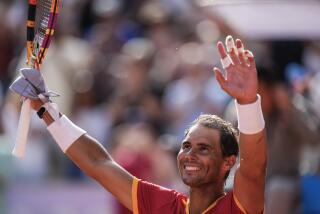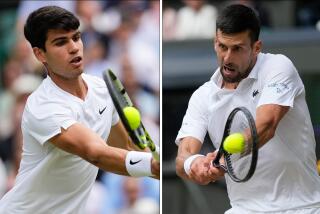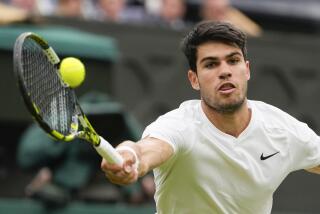Evaluating the âRafa factorâ
WIMBLEDON, ENGLAND â Talk of the dilapidation of American tennis has droned on for so long that itâs stale; talk of the dilapidation of Australian tennis has revved up long enough that itâs audible; and talk of the dilapidation of British tennis has blared roughly since dinosaurs roamed the earth.
Meanwhile, just look at the wake of the defending champion Rafael Nadal, even after he withdrew from this Wimbledon and took his muscles to Mallorca: six male Spaniards (plus two females) in the final 32.
As three of the richest tennis countries rummage around for diagnoses and prescriptions, that oft-lone cowboy Andy Roddick swept to the third round on Thursday for the United States; that old codger Lleyton Hewitt did so for Australia; and the most dissected player on earth, Andy Murray, did so for Britain.
âYou know, we canât sort of just, you know, go along sort of accepting the results that weâve had,â Murray said. âPeople who are in charge and are running things need to come out and, I think, say, âYou know, this isnât acceptable.â â
âYeah, weâre going through the same situation,â Hewitt said of the erstwhile tennis kingdom of Australia.
âI wish we had three or four Sam Querreys out there right now,â Roddick said, referring to the promising 21-year-old from Thousand Oaks.
So, as Murray stands alone among 11 original Britons male and female; and Hewitt joins the womenâs third-rounder Sam Stosur among the Aussies; Roddick does have three male countrymen and three women but pines a bit for a coming generation rich in numbers.
âItâs not a coincidence,â he said of his and Mardy Fishâs remaining afloat in this Wimbledon menâs singles draw after they tore through high school together among six outstanding juniors. âThereâs a jealousy factor,â Roddick said. âWhen someone else does well, you want to do well.â
He has wandered through the heavy vagaries of the top 10 long enough -- seven years -- that he barely even notices the weight anymore. He has traveled through paradigms all the way to a promising present with Larry Stefanki as coach. At 26, he looks leaner and clearer, as in his 6-4, 6-2, 3-6, 6-2 win Thursday over No. 39 Igor Kunitsyn of Russia.
âYou know, Iâd love nothing more than for some, you know, young 17-, 18-year-old to pop out and get in there in the top 15 or the top 10,â Roddick said. âBut, you know, you really canât deal in hypotheticals. . . . You know, this ainât Candy Land. We canât really make fantasy worlds up.â
As rich countries grope, Venus and Serena Williams field the same questions and respond with bids at encouragement for players such as Vania King, who lost in the second round, or Melanie Oudin, the 17-year-old from Atlanta who found her first third round in only her third Grand Slam event by beating Yaroslava Shvedova of Kazakhstan 3-6, 6-2, 6-4.
Similarly, even as the Australians have Stosurâs recent French Open semifinal accomplishment, they realize that if Hewitt ever decided to go home and help change diapers -- less likely after his benchmark three-set win Thursday over No. 5 Juan Martin Del Potro -- the landscape goes so outback that the next two males rank Nos. 141 and 158.
Then there are the Britons, the royal rulers of self-flagellation on this matter. They have conducted a loud hoo-ha since their extravagantly funded armada crashed dramatically here, going only 3-10 so far after the masterful win Thursday by Murray, a player who at 15 moved to . . . Spain.
Fernando Verdasco, David Ferrer, Juan Carlos Ferrero, Albert Montanes, Tommy Robredo, Nicolas Almagro -- even sans Nadal, theyâre all in the final 32 of a tournament their countrymen used to pooh-pooh, and an unknown named Daniel Gimeno-Traver came within points of making it seven.
Verdasco, No. 8 in the world, has made the Roddick-like point that numbers help, that seeing Feliciano Lopez make the quarterfinals in 2005 motivated him and made him think, âThat makes to have confidence, no?â
And as this Wimbledon so clearly accentuates the various states of tennis, with Spain only one example (and France another), it also bolsters a point made last year by Manolo Santana, the Spanish 1966 Wimbledon champion.
âDo you know what?â he said. âThe guy who changed the whole thing is Rafa. Because he has been talking since he was 17 or 16, because in his mind or in his dreams he will win Wimbledon, OK?. . . . The other guys, they seem like if Rafa goes there, why donât we try.â
Some force, that Nadal. Heâs palpable even in absentia.
--
More to Read
Go beyond the scoreboard
Get the latest on L.A.'s teams in the daily Sports Report newsletter.
You may occasionally receive promotional content from the Los Angeles Times.










